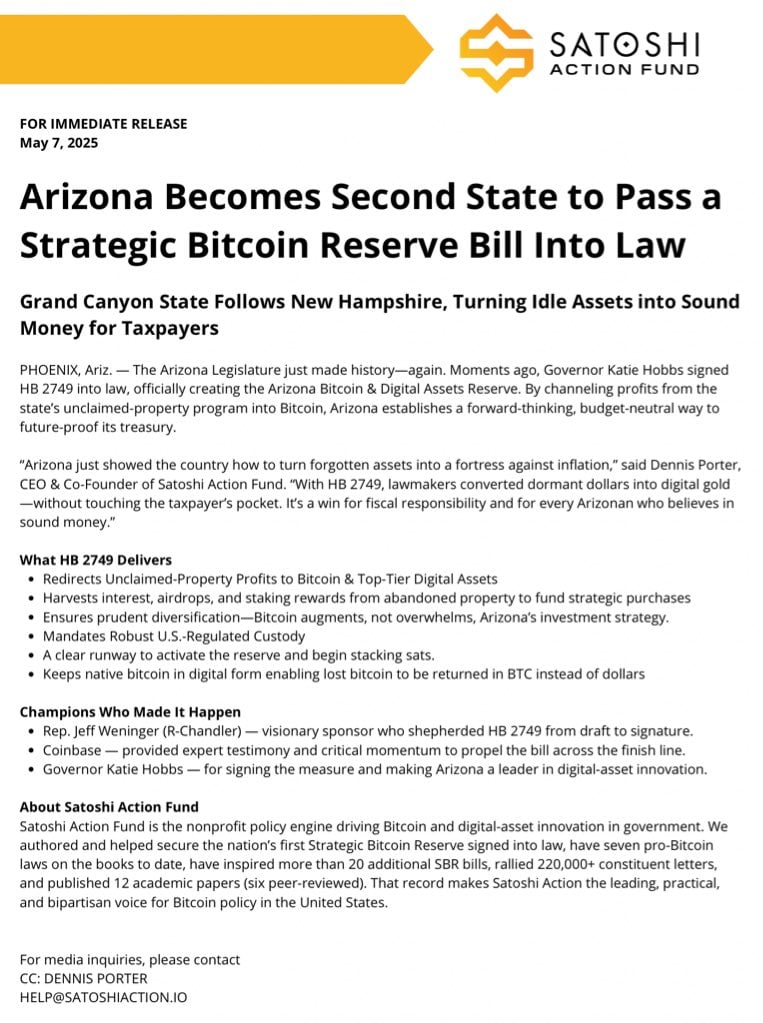Key Takeaways
- Arizona has officially enacted House Bill 2749, creating a state-managed Bitcoin and Digital Assets Reserve Fund.
- The fund, however, holds unclaimed digital assets and staking rewards.
Share this article
Arizona Governor Katie Hobbs has signed House Bill 2749, which aims to establish a reserve fund for Bitcoin and other digital assets, into law, making the state the second in the US to create such a framework, according to a new announcement from Dennis Porter, CEO of Satoshi Action Fund.

The signing came shortly after Hobbs vetoed Senate Bill 1025, a separate Bitcoin reserve bill that would have allowed the state to invest up to 10% of treasury and pension assets in digital assets like Bitcoin.
In her veto message, the governor stated that “Arizonans’ retirement system is strong because it sticks to proven investment strategies,” and that it’s inappropriate to expose the state’s retirement funds to untested investments like digital assets.
Porter said that of all the crypto proposals presented to Hobbs, House Bill 2749 stood out as her favorite due to its budget-neutral design.
Introduced in February and backed by Representative Jeff Weninger with bipartisan support, the legislation directs the state treasurer to oversee a reserve fund consisting of digital assets acquired through airdrops, staking rewards, and interest.
The assets may be actively staked by a qualified custodian to generate returns for the state. Any rewards earned on unclaimed digital assets held for three years will be deposited into the new fund.
Under the legislation, digital assets would be handled by a qualified custodian and could be actively staked to earn additional rewards. If assets remain unclaimed for three years, any staking gains or airdrops would be transferred to the new reserve fund.
Importantly, HB 2749 outlines that digital assets will be presumed abandoned after three years of inactivity, unless the owner takes demonstrable actions like logging into an account, conducting a transaction, or initiating communication.
The bill also prohibits the state from selling digital assets below prevailing exchange prices and adds digital assets to Arizona’s statutory framework governing the sale of unclaimed property. Sales would be conducted via recognized digital asset exchanges or by commercially reasonable methods for less-liquid tokens.
Arizona takes a less active approach
Compared to New Hampshire’s House Bill 302, which was signed into law yesterday and made the state the first in the US to pass a Bitcoin bill, Arizona’s House Bill 2749 is considered less active in its approach.
New Hampshire’s HB 302 authorizes the state treasurer to allocate up to 5% of public funds into digital assets with a market capitalization exceeding $500 billion—currently only Bitcoin. This law permits direct investment, allowing the state to purchase and hold Bitcoin as part of its strategic reserves.
Nevertheless, the legislation’s passage means Arizona is laying critical groundwork for integrating digital assets into state finance, and it still represents a meaningful milestone.
Share this article


